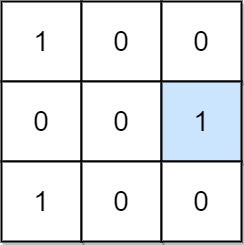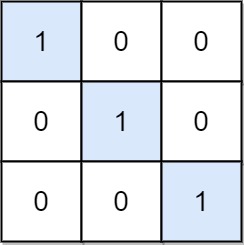1582 Special Positions in a Binary Matrix - Easy
Problem:
Given an m x n binary matrix mat, return the number of special positions in mat.
A position (i, j) is called special if mat[i][j] == 1 and all other elements in row i and column j are 0 (rows and columns are 0-indexed).
Example 1:

Input: mat = [[1,0,0],[0,0,1],[1,0,0]] Output: 1 Explanation: (1, 2) is a special position because mat[1][2] == 1 and all other elements in row 1 and column 2 are 0.
Example 2:

Input: mat = [[1,0,0],[0,1,0],[0,0,1]] Output: 3 Explanation: (0, 0), (1, 1) and (2, 2) are special positions.
Constraints:
m == mat.lengthn == mat[i].length1 <= m, n <= 100mat[i][j]is either0or1.
Problem Analysis:
-
Initialization:
row_onesandcol_onesare initialized to store the count of ones in each row and column, respectively. -
Counting Ones: The first loop iterates through the matrix, counting the number of ones in each row (
row_ones) and each column (col_ones). -
Checking Special Positions: The second loop iterates through the matrix again and checks if a cell has a value of 1 (
nums[i][j] == 1) and if it's the only one in its row (row_ones[i] == 1) and the only one in its column (col_ones[j] == 1). If all conditions are met,resultis incremented.
Time Complexity: The time complexity of the code is O(rows * cols) because there are two nested loops that iterate through the entire matrix.
Space Complexity: The space complexity is O(rows + cols) as we use two additional lists (row_ones and col_ones) to store counts for each row and column.
Solutions:
class Solution:
def numSpecial(self, mat: List[List[int]]) -> int:
result = 0
rows, cols = len(mat), len(mat[0])
row_ones = [0] * rows
col_ones = [0] * cols
# count 1s in rows and cols
for i in range(rows):
for j in range(cols):
if mat[i][j] == 1:
row_ones[i] += 1
col_ones[j] += 1
# check and increment
for i in range(rows):
for j in range(cols):
if mat[i][j] == 1 and row_ones[i] == 1 and col_ones[j] == 1:
result += 1
return result
 Walter Teng.
Walter Teng.